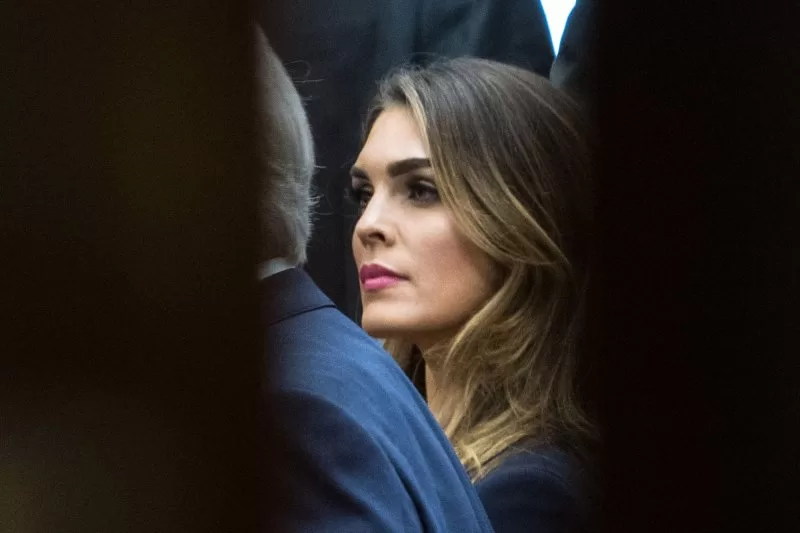May 3 (UPI) — The third week of the hush-money trial of Donald Trump concluded Friday with testimony from former aide Hope Hicks.
Hicks, former White House communications director under Trump, testified under subpoena Friday as a witness for the prosecution. She was once one of Trump’s closest advisers, recalling that she traveled with him “almost every day” during his campaign.
As she took the stand, Hicks commented that she was “really nervous.”
The central focus of the prosecution’s questioning of Hicks was the infamous “Access Hollywood” tape. Hicks recounted her reaction to learning of the tape through an email from former The Washington Post reporter David Fahrenthold.
Hicks said she was very concerned about the tape, though she had only read a transcript of it at the time. She forwarded Fahrenthold’s email to others in the Trump campaign, urging that they need to hear the tape.
“Need to hear the tape to be sure, deny, deny, deny,” Hicks wrote in an email to campaign officials including Kellyanne Conway, Steve Bannon and Jason Miller.
“There was consensus among us all that the tape was damaging and that this was going to be a crisis,” Hicks testified.
Hicks added that Trump downplayed the conversation heard on the tape, first stating that it “didn’t sound like something he would say.”
“I think he felt like it was pretty standard stuff for two guys chatting with each other,” Hicks said.
Hicks remained on the witness stand following about an hour lunch break.
After the break, the questioning shifted to Trump’s alleged affairs with adult film actress Stormy Daniels and Playboy model Karen McDougal. A story about the affairs was published in a November 2016 issue of the Wall Street Journal. She did not recall the exact phrasing of the denial she gave to the Wall Street Journal and said she was reluctant to suggest she phrased the denial verbatim from Trump.
She said she did recall Trump instructing her to deny the allegations that he had an affair with Daniels.
“What I told to the Wall Street Journal is what was told to me,” Hicks said.
She later added that Trump was concerned about his wife, Melania Trump, seeing the story.
“I don’t think he wanted anyone in his family to be hurt or embarrassed by anything that was happening on the campaign,” Hicks said. “He wanted them to be proud of him.”
Hicks testified under subpoena and noted that she is paying for a lawyer in relation to this proceeding. She said she has not spoken to Trump since 2022.
Judge Juan Merchan opened Friday’s proceedings clarifying to the former president that the gag order against him does not block or limit his ability to testify. Trump claimed outside the courtroom Thursday that the gag order does not allow him to take the stand.
Merchan also clarified his ruling on the “Access Hollywood” tape, saying a full transcript will be allowed into evidence.
Initially, Merchan ruled an article and photo of Trump and Billy Bush, published in the Washington Post, would not be allowed.
“It’s very powerful evidence. It’s damning evidence and I don’t think it’s necessary,” the judge said of the article.
However, the defense later agreed to the article being included in evidence with the caveat that no witnesses will be questioned about it.
Trump’s attorney Todd Blanche argued that a post from Trump on social media last August should not be entered into evidence, either. The post on Truth Social read, “If you go after me, I’m coming after you.”
Blanche said this post was directed at political donors as Trump was campaigning for the Republican nomination for president. Trump has since earned the delegates required to be named the nominee at the Republican National Convention in July.
Merchan ruled that the post will come into evidence, saying the prosecution established an appropriate foundation for it.
Forensics expert Douglas Daus returned to the witness stand to discuss audio recordings and text messages between Trump and his former attorney and alleged “fixer” Michael Cohen.
In these conversations Cohen and Trump discussed the “catch and kill” scheme to stop a story about the former president’s affair with McDougal from being published, according to Daus’ testimony Thursday.
Daus also mentioned conversations between Cohen and Hicks.
Before she left the witness stand Friday, Hicks said she found Cohen to be a liability for Trump’s campaign when he would involve himself in its operations.
“I used to say he would like to call himself a ‘fixer,’ or ‘Mr. Fix-it,'” Hicks said. “But it was only because he first broke it.”
After the jury left Friday, Merchan denied the prosecution’s request to cross-examine Trump on his gag order violations, siding with Blanche who argued, “it invites a sideshow that the people don’t need.”
Speaking with reporters outside of the courthouse after the day’s proceedings, Trump said he was “very interested in what took place today.”
Trump also criticized the Manhattan District Attorney for “letting violent crime run rampant all over our city” while attacking his company.
“What they’ve done to people in my company, they’ve been after us for years,” Trump said, while calling district attorneys “radical left lunatics.”
“In the meantime, you can’t do anything in the country. The country is going to hell.”
Trump is allowed to criticize the judge and the prosecutor under the terms of his gag order.
Trump faces 34 felony charges related to allegedly falsifying business records in an attempt to hide hush-money payments made to McDougal and Daniels while he campaigned for president in 2016.
